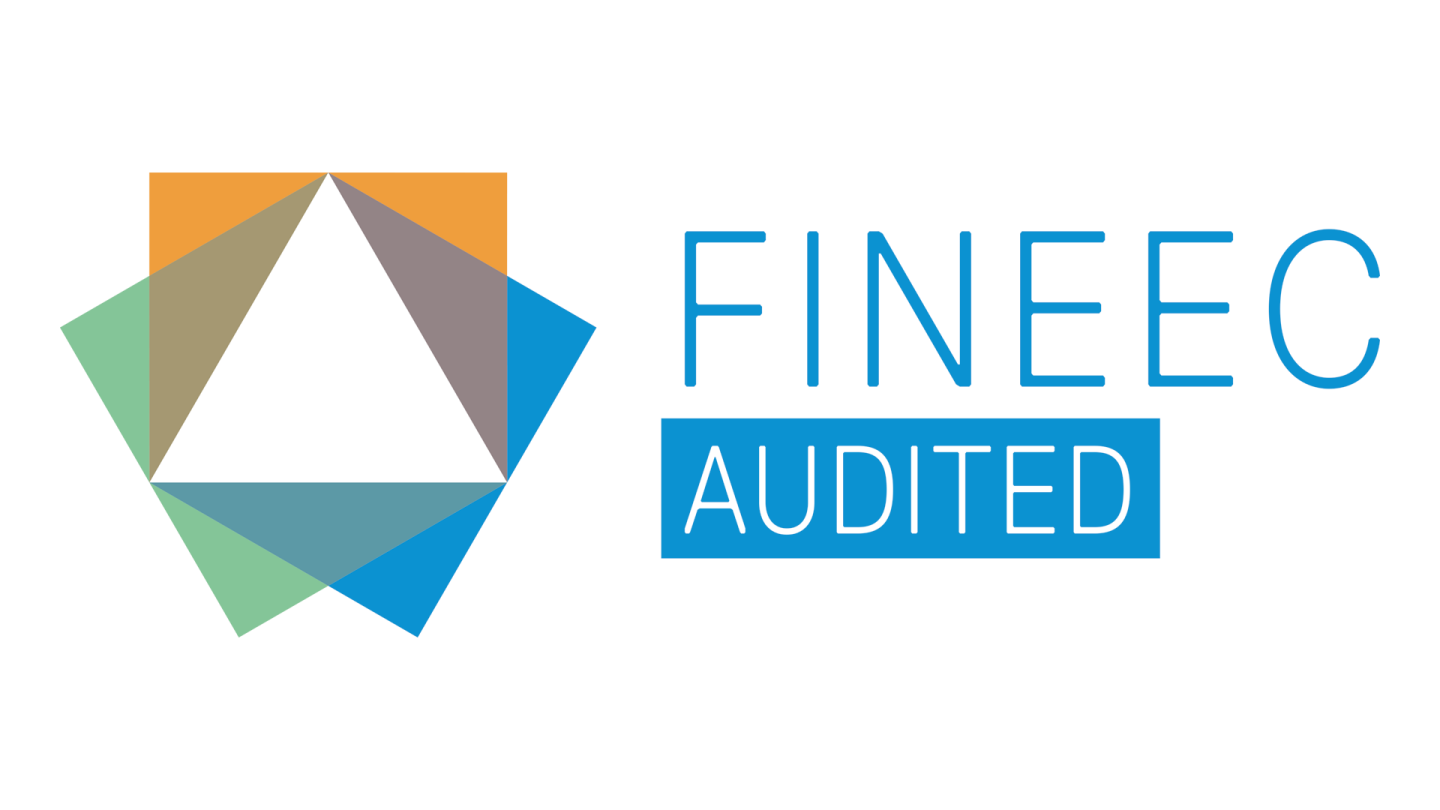Quality Management at the University of Turku
The quality of the University’s activities is promoted with academic culture, determined steering, competent support services, and structured quality management. An essential part of the quality work is maintaining a common knowledge base.
The targets of quality work include the University’s basic missions – research, education, societal interaction – and the services and functions supporting them. The quality system is directed at different organisational levels. It includes University-level and unit or function-specific elements.
As a general operational model, the PDCA cycle (Plan–Do–Check–Act) is followed in the University’s quality work.
The competent, committed, and persevering activities of every member of the University community are at the core of quality work.
The University of Turku creates prerequisites for high-quality and innovative operations. The University maintains and develops strong operational culture and provides efficient and expert services to support the basic missions. The University-level steering with clear processes and quality management that covers the entire operations are part of the quality system. The purpose of the quality system is to ensure quality as well as to develop quality.
The goals of the University’s quality work are:
- supporting the realisation of the University’s mission, values and vision,
- promoting the University’s Strategy and Policy Programme,
- promoting the quality of research and education and societal impact,
- promoting the University’s national and international competitiveness, and
- maintaining high quality in practical work.
The entire University community participates in the continuous development of high-quality operations as a natural part of their work and activities. The Rector of the University is responsible for quality work as a whole and appoints one of the vice rectors as responsible for the quality management as a whole. The University-level coordination of quality management is handled by the Strategic Planning unit. The unit management is responsible for quality work in their unit and the responsible persons of operations and services in their own areas. The University systematically collects and utilises feedback from the stakeholders.
Functions of quality management include purposeful instructions, well-functioning feedback systems, strengthening the competence of the University community and promoting good practices, notable assessments and accreditations, necessary targeted quality systems, and internal auditing and risk management. Up-to-date and anticipatory monitoring of operations, results, finances, and the operational environment are central to quality management and knowledge-based management. The University’s internal quality documentation includes the Quality Manual as well as University-level and necessary unit-specific instructions. The University’s quality system and the principles for its development are described in the Quality Manual. The University-level regulations and instructions have been compiled into the intranet.
The quality system consists of practices supporting high-quality activities and includes (1) academic culture, (2) steering, (3) competent support services, and (4) quality management. The quality system supports the Univeristy's management system.
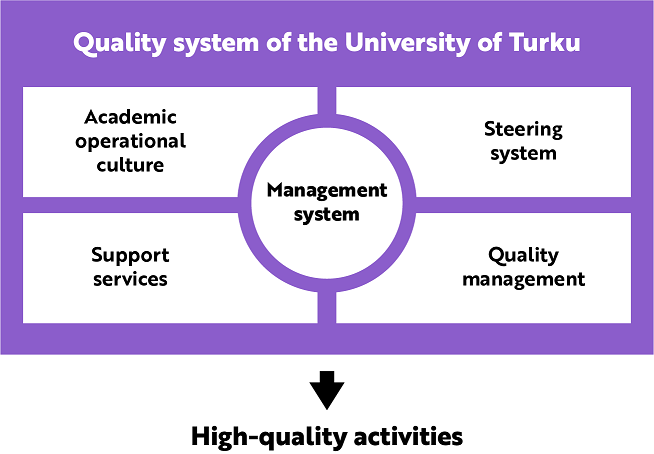
In developing quality, the PDCA cycle (Plan–Do–Check–Act) is followed. Aiming at achieving the goals, it is an operational model that is based on the constantly continuing process of planning, implementation, assessment, and development activities.
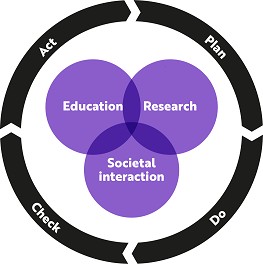
The quality system is assessed and developed in the manner determined by the Quality Manual. In development work, the quality map determining quality work’s targets and modes of operation is utilised as well as the operational plan of quality management.
The Quality Manual includes the description of the quality system at the University of Turku, the principles of quality work development, and a list of revisions. The purpose of the Quality Manual is to support the University management at different levels and strengthen the University community’s opportunities to participate in the quality work. It also documents the principles and practices of the University’s quality work for the stakeholders.
The quality system as a whole and the key concepts are defined in the first chapter.
The second chapter handles the University's operational culture and quality work of the basic missions.
The principles of steering and the processes for strategy and annual planning are described in the third chapter.
The fourth chapter covers the role of the University Central Services in the University’s organisation as well as the quality management of services and the feedback system.
The fifth chapter is a summary of the quality management functions and developing the quality system as a whole.
The Research Council steers the quality work of research at the institutional level. Its main principles are academic peer-review and good scientific practice. The Research Assessment Exercise RAE is carried out on a regular basis. Key development targets include the practices of open science, infrastructures as well as research data management and indicators. A guide for Project Leaders on the intranet and the steering system TOPI are examples of policy tools.
The Teaching and Learning Council steers the quality work of education. The University regulation on studies and the rules of procedure for the University of Turku Graduate School (UTUGS) are central regulations. Core functions include systematic curricula work, pedagogical education and training and feedback systems. Detailed guidelines are available for student selection and specialisation education. The teacher and the course of the year are selected annually.
The extended management group of the University acts as the steering group of societal interaction. Systematic stakeholder cooperation and well-outlined follow-up steer the multifaceted activities. Some external evaluations take into account the perspective of interaction. Examples of tools include Konsta- and UtuCris-systems as well as the ‘Korkeakoulukumppani’ channel that reduces the threshold for initiatives and feedback.
The extended management group also steers University’s support services whereas the management group of University Central Services is responsible for the production. The main content of the services is accessible through the Service index on the University intranet. You can also find useful materials in handbooks, rules of practice, orientation pages and through the information systems of administration and finances. The service development makes use of a manifold feedback system and regular surveys of well-being at work.
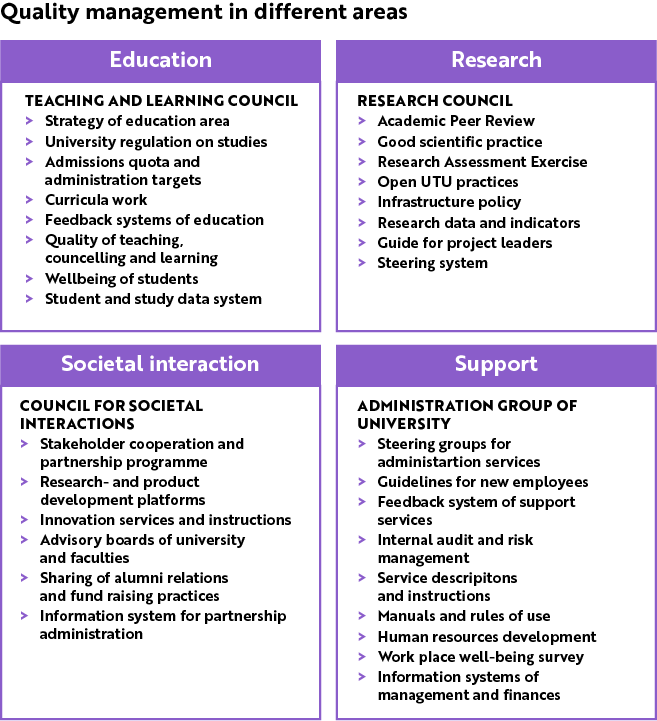
The competent, committed, and persevering activities of every member of the University community are at the core of quality work.
Responsible for the quality work of the University, the Rector leads and steers the University’s activities according to the policies of the Strategy and the University Board. The quality systems belong to the remit of Vice Rector Piia Björn who is responsible for education and the development of educational structures.
Organising quality work at faculties is the responsibility of the deans, at departments that of the heads of department, and at the University Central Services that of the heads of units.
The Rector has appointed a Steering Group for Quality Work with the duty to prepare and monitor the implementation of the strategic policies of the University’s quality management. The chair of the steering group is Vice Rector Piia Björn, the vice chair is Director of Strategic Planning Päivi Mattila-Wiro, coordinators are Quality Manager Juha Sainio, and Development Specialist Ilona Tuominen.
The Quality Manager of the University is responsible for:
- coordinating and developing quality management according to the policies of the University Management and the Steering Group for Quality Work,
- preparing and monitoring the implementation of the decisions on quality management,
- reporting on quality work as a whole to the University management,
- promoting good practices together with the University community,
- keeping the Quality Manual up to date.
The instructions as a whole are coordinated in collaboration with the University Communications.
The external evaluations are focused on both the University's operations and results and on maintaining and developing quality.
In addition to continuous peer-reviews, the Research Assessment Exercise (RAE) is carried out at regular intervals. The previous RAE was carried out in 2015–2016, and the preparation for the new one has been started. The basis for developing education are well-functioning feedback systems. Education is also a central target for higher education institution audits.
In the Finnish audits of higher education institutions, quality work as a whole is being analysed. Auditing is independent and systematic external evaluation. It evaluates whether the quality system of the higher education institution is purposeful and functional and fulfils the set criteria. The targets for evaluation are the procedures the higher education institution uses to maintain and improve the quality of its operations.
An international group of experts audited the University of Turku's quality system in 2017. The University received a quality label (in Finnish) from the Finnish Education Evaluation Centre (FINEEC) which is valid until 16 June 2023.
The University and its units participate in accreditations purposeful in terms of their operations. Turku School of Economics (TSE) is an accredited member of the AACSB International (The Association to Advance Collegiate Schools of Business), and is committed to continuously develop its activities and quality system based on the AACSB standards. TSE earned the accreditation in 2019, and it is valid until 2024.
The University and its operations are also evaluated as a part of ranking processes. In addition, the University takes part in different kinds of evaluations of education and research as well as thematic surveys.
>> Audit report
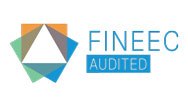
The values defined in the University’s Strategy include openness and communality. An essential part of quality work is the opportunity of the University community members and external stakeholders to make initiatives, participate in developing the University in different ways, and give feedback on the University’s operations. In the University community, parties are students as well as the academic and other personnel. Important stakeholders include the individual users of the services and partners in co-operation, companies, and public organisations and associations.
Students are equal members of the academic community. By communicating and collaborating, the University and the Student Union ensure that the roles of both the University and the Student Union regarding the University’s educational mission are fulfilled. Central opportunities to influence the operations include the feedback systems of teaching and education. The feedback given at different phases of the studying process is documented and handled, and the students are given feedback on taking it into account.
Personnel can influence the University’s activities in several ways through its own work and expertise. The personnel’s channels of influence include e.g. development discussions, working groups, decision-making, well-being surveys, and procedures in compliance with the Act on Co-operation in Undertakings. The personnel’s participation and well-functioning work community practices are the cornerstones of workplace well-being.
Stakeholders can affect the University’s operations as members of the University organs and working groups and by participating in e.g. the strategy process and planning of the curricula.
It is also possible to participate by providing teaching and working as a supervisor. Development work can be taken part in as a partner in e.g. research and development projects. Buying research or education services and donating influence the University’s finances directly. A central channel for stakeholder co-operation are the alumni activities.
The documentation on the University’s quality system is mostly available on the University’s Intranet and data systems. Quality work is described for stakeholders on the University’s website. The most central quality documents include:
- The Quality Manual guides the quality work by documenting the principles of the quality system and the functions and practices of quality work. The Rector of the University approves the Quality Manual.
- The University-level instructions for the whole University community are found in the intranet
- Central steering documents include the University’s Strategy 2021–2030 and the annual planning documents found in the intranet
- The University-level instructions of the faculties, departments, and units that complement the Quality Manual
The information systems needed in the planning, following, and reporting of operations are maintained centrally and they have been integrated into the Univeristy's common data warehouse.
More information on quality management is given by Quality Manager Juha Sainio and Development Specialist Ilona Tuominen.
